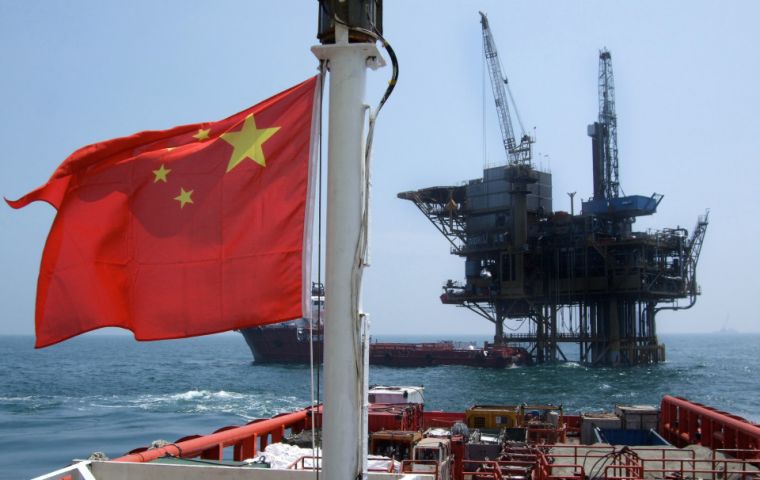MercoPress. South Atlantic News Agency
China preparing to begin paying for imported oil with the Yuan
 Oil is the world's most traded commodity, with an annual trade value of around US$14 trillion, roughly equivalent to China's gross domestic product last year.
Oil is the world's most traded commodity, with an annual trade value of around US$14 trillion, roughly equivalent to China's gross domestic product last year. China is taking its first steps towards paying for imported crude oil in Yuan instead of the U.S. dollar, according to Reuters, a key development in Beijing's efforts to establish its currency internationally.
Shifting just part of global oil trade into the Yuan is potentially huge. Oil is the world's most traded commodity, with an annual trade value of around US$14 trillion, roughly equivalent to China's gross domestic product last year.
A pilot program for Yuan payment could be launched as early as the second half of this year. Regulators have informally asked a handful of financial institutions to prepare for pricing China's crude imports in the Yuan, according to some financial firms.
“Being the biggest buyer of oil, it's only natural for China to push for the usage of Yuan for payment settlement. This will also improve the Yuan liquidity in the global market”.
China is the world's second-largest oil consumer and in 2017 overtook the United States as the biggest importer of crude oil. Its demand is a key determinant of global oil prices.
Under the plan being discussed, Beijing could possibly start with purchases from Russia and Angola. Both Russia and Angola, like China, are keen to break the dollar's global dominance. They are also two of the top suppliers of crude oil to China, along with Saudi Arabia.
The move would mark a major step in reviving usage of the currency of the world's second-largest economy for offshore payments after several years of on-again, off-again measures. If successful, it could also trigger shifting other product payments to the Yuan, including metals and mining raw materials.
The plans coincide with last week's launch of the first Chinese crude oil futures in Shanghai, which many expect to become a third global price benchmark alongside Brent and West Texas Intermediate crude. Shanghai's new crude contract is traded in Yuan.
U.S. bank Goldman Sachs said in a note to clients this week that the success of Shanghai's crude futures was “indirectly promoting the use of the Chinese currency.”
The Yuan retained its No.5 ranking as a domestic and global payment currency in January this year, unmoved from a year ago, but its share among other currencies fell to 1.7% from 2.5%, according to industry tracker SWIFT.
Nearly 90% of all transactions in the US$5 trillion-a-day currency markets involve the dollar on one side of a trade, while only 4% use the Yuan, as per a triennial forex survey by the Bank for International Settlements.




Top Comments
Disclaimer & comment rules-

-

Read all commentsAll those countries that have been dreaming of seeing the downfall of the dollar might get what they wished for, but the consequences may be not what they wanted.
Apr 03rd, 2018 - 02:17 am 0BRICS is already the largest supra-national organization on the planet!
Apr 03rd, 2018 - 02:33 pm 0You need to meet Sara.
https://www.youtube.com/watch?v=s9EQw85uRRk
Commenting for this story is now closed.
If you have a Facebook account, become a fan and comment on our Facebook Page!